
- Wind Powered Web Hosting
- Green Company Practices
- Green Personal Practices
- Community Involvement
- SE PDX Green Team

Oregon Website Design's Office and Hosting Servers Use 100% Clean Wind Power:
Oregon Website Design purchases Portland General Electric Clean WindSM renewable energy credits to offset 100 percent of our office equipment energy use. Clean Wind helps you offset your carbon dioxide emissions.
Clean Wind is 100 percent new wind power with the same reliability you depend on from PGE. This carbon-free power comes from wind farms and is endorsed by such groups as the Renewable Northwest Project, Northwest Energy Coalition and Natural Resources Defense Council.
We strongly recommend you learn more about how you can participate in PGE renewable programs for home and business. Check out the residential renewable and commercial renewable programs from Portland General Electric.
3Degrees Certification - Minimizing our Carbon Footprint: VIEW OUR WEB HOST'S GREEN CERTIFICATION
Oregon Website Design hosts with PDX Web Hosting who uses 3Degrees to offset any impact that their web hosting servers have through the purchase of Certified Renewable Energy Certificates. Their commitment to supporting clean energy prevents the emission of 5 metric tons of greenhouse gases from entering the atmosphere and will have the equivalent environmental benefit of protecting 1 acre of forest annually.
3Degrees helps organizations match their electricity use with Green-e© Energy Certified Renewable Energy Certificates (RECs). By purchasing RECs, PDX Web Hosting helps provide renewable energy project owners with a revenue stream that supplements the revenue they secure from the sale of the project's electricity thereby increasing green energy producers' competitiveness with fossil fuels like coal and natural gas.

Oregon Website Design practices green/sustainable business techniques including the following:
- Our company car used to visit customers on site is an Electric Hybrid with a mpg rating of 70 mpg!
- We use rechargeable AA batteries for all computer accessories. Estimated AA Batteries kept out of landfill per year= 200+ batteries.
- AA batteries are recharged by a solar recharger built from recycled solar lawn lights.
- All overhead lights in home offices are LED and/or compact fluorescent bulbs.
- All overhead lighting at main office is fluorescent and automatically shut off when there is no motion in the room.
- We invoice using electronic invoicing only. GREEN FACT: 1 tree can be saved for every 13 customers using paperless invoicing!
- All Employees work primarily from their home offices. 5 less vehicles on the road for the morning & evening commutes.
- We turn off all workstations, printers, and other equipment when not in use and after work hours.
- Keep paper and other unsustainable goods use to a minimum. Our company will typically use 1-2 reams of paper per year.
- Use public transportation Amtrak, Trimet, bicycle, or walk to and from our office, data center, and when visiting customers in other states.
- Donate our old electronics to local electronics recycling companies such as Portland Youth Builders and Free Geek.
- Purchase only locally made goods and services whenever possible.
- Support other local businesses that perform green/sustainable business practices.
- Reduce, Re-use, Recycle!
Recycling:
Our VP of sales and marketing is a Portland Metro Certified "Master Recycler" as well as the founder of the Southeast Portland "GreenTeam". She organizes the Woodstock Neighborhood Cleanup.
Minimizing Our Carbon Footprint:
The CEO of Oregon Website Design participated in the "Portland Low Car Diet" put on by the City Of Portland and "Flexcar". As a result of this experience the CEO of Oregon Website Design sold his Honda Accord (which got 28Mpg city/31mpg highway) and committed to using alternative and public transportation, including Trimet, Flexar/Zipcar, Amtrak, Bicycle and Walking and has been doing so since Nov. 2007.
Green/Sustainability Resources:
- Portland Metro Website
- Southeast PDX Green Team - See Tab Above
- Southeast Sustainability Committee
- Bicycling and Walking in Portland

Note from the CEO:
"Living a sustainable lifestyle is critical in both business and personal practices. I challenge myself and others to take measure of everyday practices. If you look at the metrics of changing just one behavior, you can not deny the power of one individual's impact on the environment. My personal commitment to help strengthen and sustain our environment and local Northwest economy includes:
- Using low-flow plumbing fixtures around the home.
- Using paints and stains with no or low Volatile Organic Compounds (VOCs).
- Keeping coffee cups from local coffee shops out of landfills by bringing our own washable cups to the shops...or just brewing coffee at home.
- Unplugging household appliances when not in use to avoid "vampire" or standby power consumption.
- Growing our own herbs and vegetables in unused yard areas and creating raised garden beds on cemented areas.
- Practice naturescaping techniques including planting only edibles and/or natives.
- Capturing rain from our roof in our 275 gallon rain barrel system for watering our garden, and keeping the run off water from adding to Portland's storm drain/sewer problems.
- Composting vegetable, fruit, and eggshell waste for our garden.
- Managing an ever growing worm bin for the worm tea “Fertilizer Gold”.
- Avoiding use of chemical fertilizers, therefore keeping chemicals out of our streams and rivers.
- Purchasing farm shares and supporting our local CSA (Community Supported Agriculture).
- Purchasing vegetables, meats, and other products produced right here in Oregon from local farmer's markets. List of Markets in Oregon.
- Purchasing locally made goods and services. (Shop Local!)
- Shopping at and supporting People's Co-Op grocery.
- Using public transportation, bicycle, and walking since July, 2007 (to date 01/09/2026) after participating in the second annual "Portland Low car diet".
- Always using canvas/reusable bags at grocery store rather than plastic or paper bags.
- Taking recyclable items that are not allowed in curbside program (rigid plastics, packaging, etc) to Far West Fibers for recycling.
- Encouraging our employees and others to do the same when possible."
Michael Rocheleau
CEO, SENN Systems LLC.

Employees of Oregon Website Design volunteer in several community groups including: Friends of the Woodstock Community Center, Woodstock Neighborhood Association, Friends of Trees, Family of Friends, Woodstock Neighborhood Cleanup, Southeast Plastics Roundup, Southeast Uplift, as well as the recently developed Southeast PDX Green Team.
Woodstock Community Center
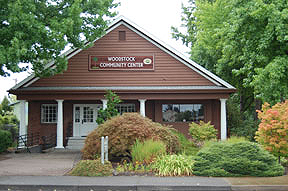 Lonnie Port, Chair of the FWCC, working closely with Jeff Milkes from PP&R, and Cliff Bryson, the sign maker, along with members of the FWCC, ushered this project through. Jeff worked with City Bureau's, permitting offices and city engineers to assure the proper permits were issued and building codes were followed. Lonnie oversaw design and color and liaised with all parties, keeping lines of communication open.
Lonnie Port, Chair of the FWCC, working closely with Jeff Milkes from PP&R, and Cliff Bryson, the sign maker, along with members of the FWCC, ushered this project through. Jeff worked with City Bureau's, permitting offices and city engineers to assure the proper permits were issued and building codes were followed. Lonnie oversaw design and color and liaised with all parties, keeping lines of communication open.
Cliff Bryson, the Woodcarver offered his expertise regarding signage of this magnitude. Cliff Bryson is also the woodcarver who created the Woodstock entrance signs that flank the boulevard in the medians. READ FULL STORY AT SOUTHEAST UPLIFT....
Earth Day Woodstock Neighborhood Cleanup
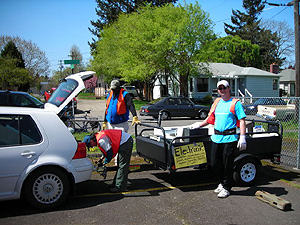 Our CEO hard at work collecting computers and other electronics to donate to "Free Geek".
Our CEO hard at work collecting computers and other electronics to donate to "Free Geek".
Woodstock Neighborhood Cleanup
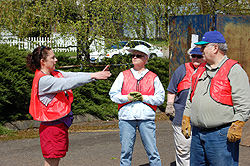 Giving instructions to volunteers.
Giving instructions to volunteers. 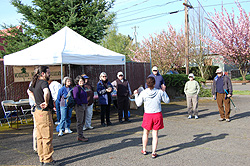
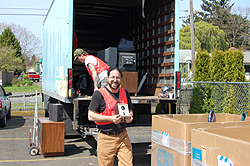 Collecting electronics to recycle.
Collecting electronics to recycle. 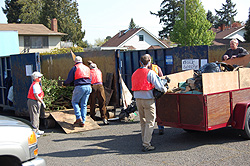 Volunteers hard at work.
Volunteers hard at work. Southeast PDX Green Team "Barn Raising"

Sellwood, Milwaukie, and Woodstock PDX Green Team members have begun “barn raising” projects- working together on each other’s home eco-improvement tasks.
They are pictured spreading bark mulch, amending soil and socializing at the home of a Woodstock Green Team couple.

The Southeast "Green Team" was founded by our VP of sales and marketing, Lonnie Port.
 After their first project—cleaning bus stops on Woodstock Boulevard—the Green Team (Lonnie Port, Dan Steigerwald, Carey Collins, and Bill Steimer) met to plan their next activity.
After their first project—cleaning bus stops on Woodstock Boulevard—the Green Team (Lonnie Port, Dan Steigerwald, Carey Collins, and Bill Steimer) met to plan their next activity.
Someone suggested that the team and their spouses get together for a sustainable potluck supper, providing an opportunity both to think about sustainable eating and other topics related to reduce/reuse/recycle and to get their spouses on the team.
The first dinner took place at the height of the harvest in early September. Instructions were simple: bring a dish prepared with locally grown ingredients and be ready to talk about the choices made at every stage from preparation to disposal of waste.
The goal was to reduce the carbon footprint of our food consumption, bearing in mind that the transport of food, especially prepared and refrigerated food, uses a tremendous amount of energy.
Four couples arrived bearing a veritable feast including lamb casserole with eggplant and applesauce, tomato and cucumber salad with basil, roasted carrots and potatoes, wheat berry salad with apples and mint, and peach cobbler.
All the dishes were home made, and all of them were delicious. Ingredients came from Farmers’ Markets, backyard gardens, farm shares (CSA’s), and even the grocery store. Our conversation covered such topics as solar energy, IKEA packaging, recycling in Holland (where Dan and Ann Steigerwald had lived for many years), and the possibility of recycling styrofoam with orange extract. We came from varied backgrounds and ranged in age from thirty-something to sixty-something, but our common interest in environmental issues pulled us together. We all pronounced our dinner a success and have eaten together monthly ever since.
Here are some of the things we have learned about what it takes to be a sustainable cook:
Shopping
- Ask questions about the origins of produce
- Buy in bulk
- Shop at local Farmers’ Markets
- Shop where you can use your own reusable containers for some products
- Use canvas bags at the grocery and Farmers’ Market
- Avoid using plastic bags for produce (bananas, for example, don’t need a bag)
- Look for liquid products in glass bottles rather than plastic
- Look for packaging that is easy to recycle, not a mixture of paper and metal and plastic
- Grow a few vegetables in your garden or patio if you have enough sun*
- Join a farmshare (CSA) or visit local farms where you can pick your own produce
Recycling*
- Recycle rigid plastics at Far West Fibers—never in curbside recycle bin
- Recycle packaging (cereal boxes, egg cartons, etc.) that is not permeated with food waste
- Don’t recycle styrofoam meat trays or other wrapping that has food on it (greasy pizza boxes, butter wrappers)
- Compost vegetable waste and eggshells if you have a place to do so. If your space is limited, start a worm farm.
Cooking
- Make things from scratch
- Make double batches of recipes and freeze half or use leftovers for lunches
- Grow a few (or a lot of) vegetables in your garden or on your patio if you have enough sun
Freeze and can summer produce for winter meals
Eating
- Enjoy the taste of locally grown food
- Try not to use paper plates or disposable eating utensils and cups
- Try new fruits and vegetables you find at Farmers’ Markets
- Support restaurants that buy local produce and meat
- Teach your children to cook so that they won’t become reliant on fast food
Cleaning Up*
- Use reuseable, washable cloth towels and rags, not paper towels
- Wash dishes only when the dishwasher is full
- Try using half as much dishwashing detergent as the manufacturer recommends
*Pamphlets on recycling, organic gardening and house cleaning are available from Metro
